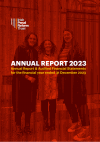IPRT in the News
As part of the Irish Penal Reform Trust (IPRT) Strategic Plan 2023-2026, one of our main goals is to campaign for a progressive criminal justice system that upholds human rights. Engagement with the media plays a large part in that as we discuss our evidence-based research, advocate for people in prison, and work to change attitudes and challenge misconceptions about people in the criminal justice system.
Below you will see a list of most of IPRT's media features including recordings of radio discussions, links to TV appearances, and access to written articles and opinion pieces. You can also listen back to long-form recorded discussions with podcast hosts on our Podcast webpage.

RTÉ: Prison overcrowding 'stark' and against EU recommendations - IPRT
16th October 2024
RTÉ reports on the Prison Overcrowding Response Group report released by Freedom of Information request and then published by IPRT.

Irish Legal News: Parole decisions taking around 18 months
15th October 2024
On 15 October, Irish Legal News wrote about IPRT's comments on the recently published Parole Board Annual Report 2023.

Irish Legal News: Concern youth detention is not being treated as last resort
10th October 2024
Irish Penal Reform Trust responded to the recent HIQA report on Oberstown Children Detention Campus, raising concerns that youth detention is not being treated as a last resort in spite of a statutory obligation.

Irish Legal News: Prisons experts sceptical that more money will fix system ‘creaking at the seams’
3rd October 2024
Irish Penal Reform Trust (IPRT) responded to the Budget 2025 announcements.

Irish Examiner: Coroners still to hold almost half of inquests into prisoner deaths in last 12 years
25th September 2024
On 25 Septmeber 2024, Ann Murphy of the Irish Examiner reported on statistics from a recent Parliamental Question response that indicated that coroners are still to hold almost half of inquests into...

BreakingNews.ie: Joint Committee on Traveller issues to discuss Travellers in prison
25th September 2024
On 25 September 2024, BreakingNews.ie reported that Irish Penal Reform Trust (IPRT) will be presenting to the Joint Committee on Traveller issues to discuss Travellers in prison.
Irish Examiner: Why prison is no place for the mentally ill
23rd September 2024
On 23 September 2024, Ann Murphy of the Irish Examiner wrote about the recent prison visiting committee annual reports, Mental Health Reform's report on mental health in prisons and Irish Penal Reform Trust's comments on progress on the High Level Taskforce on the mental health and addiction challenges of persons interacting with the criminal justice system, and our pre-Budget submission for Budget 2025.

IPRT Annual Report 2023 - Directors' Report and Audited Financial Statements
18th September 2024
The IPRT Annual Report - Directors' Report and Audited Financial Statements for the financial year ended 31 December 2023 was made available at the IPRT AGM on 18 September 2024.

Irish Examiner: Call for investment in prison alternatives amid overcrowding crisis
17th September 2024
Reflecting on the recent Prison Visiting Committees 2022 Annual Reports, IPRT discusses it's pre-Budget submission ahead of Budget 2025.

Law Society Gazette: Fund alternatives to prison, IPRT urges
7th September 2024
The Law Society Gazette reported on IPRT's Pre-Budget Submission for Budget 2025.




